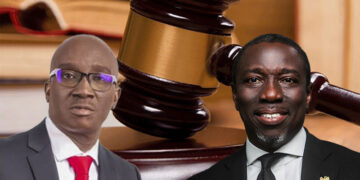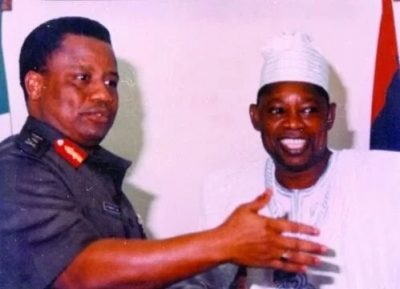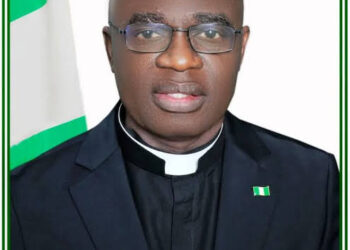The former military President Ibrahim Badamasi Babangida ‘s autobiography “A Journey in service” unveiled a fortnight ago unarguably brought back the good, the bad and the ugly of his eight years eventful regime.
Not just for the records but for all Nigerians and foreigners alike who have a sense of history. The book provided more than enough to chew.
In the autobiography, General Babangida catalogued what he did; his exploits, accomplishments and even failures but of all, one issue that resonated loudly was the annulment of June 12, 1993 Presidential election which he himself admitted was clearly won by late business mogul Chief MKO Abiola.
The annulment of that historical election remains an issue for which Nigerians across the divide had one common denominator. It was free, fair and credible. For more than a few Nigerians, there was no justification or verifiable reason(s) known to man that warranted the annulment.
For years, more than three decades, Nigerians waited with “heavy hearts” to hear from the man who midwifed the process and conversely annuled the election. Even the Chairman of the electoral umpire the Emeritus Prof Humphrey Nwosu had no answer to why the election was aborted. Reports indicated that Nwosu made frantic efforts to conclude the process but met brick walls.
Just when people thought that the issue of June 12 should be confined to the dust bin of history, General Babangida who is variously described as “Maradona or Evil Genius” came up with his long awaited autobiography in which he detailed in no holds bare “what went wrong” with June 12, 1993 presidential election.
The intrigues, power plays and horse tradings over June 12 will be a good episode in soap Oprah some day.
However, like a commander who led from the front, Babangida eventually owned up and submitted that “the annulment was a mistake, MKO Abiola won the election clean and square. He met all the known electoral standards”.
In a solemn admission of guilt, Babangida submitted “if I have the opportunity to do it again, I will do things differently”.
Unarguably, the pains and injuries of June 12 annulment judging from the loss of lives and properties especially the supreme prize paid by MKO Abiola and his wife Kudirat, the anguish can be everlasting.
Journalists, lawyers, civil society organisations and other human rights activists lost their lives. Some escaped into exile.
Yes, we are humans and it takes a good conscience to realise wrong doings. It is a mark of good upbringing to admit guilt and apologise. Babangida has taken full and absolute responsibility for what happened under his watch chief of which was the annulment of the June 12, 1993 presidential election.
Babangida has admitted guilt and apologised. He has also proposed a road map for national healing. For him, it is “never again”.
The book and its unveiling to many marked the beginning of the rebuilding and healing process. That should ordinarily and humanly matter to the Nigerian people for now. Government is a continuum, therefore restitution especially to the Abiola family and others that can be identified should not be ruled out.
The public presentation of the autobiography was akin to the “Truth Commission of Enquiry” held by South African government under the legendary Nelson Mandela after the fall of apathied to dialogue within and among themselves with a view to reconciling and healing the wounds of yester years.
For instance, that gathering of who is who in the political history of Nigeria offered former Head of State General Yakubu Gowon opportunity to explain and indeed exonerate himself from the bloody coup of February 13, 1976 that killed Murtala Mohammed. Gowon said he never had the inkling nor was he involved in the failed Lt. Col Bukar Dimka led coup. Gowon was after the coup stripped of his ranks and made ordinary.
It was a positive U-turn for Gowon when Babangida as the then Head of State reviewed his case and restored his status as a General.
Another striking point capable of healing the wounds of yester years was the clarification in the Babangida’s book that the bloody coup of 1966 led by Major Kaduna Nzeogwu was after all NOT AN IGBO COUP. The coupists had their agenda that was clearly not an Igbos.
The initial speculations by local and foreign media reports had tagged the coup which took the lives of prominent Nigerians including Prime Minister Abubakar Tafewa Balewa and Finance Minister Festus Okotie Eboh an Igbo coup.
This aggravated the pogrom and unwarranted killing of Igbos in the northern parts of Nigeria. The alleged inability of the government of Gowon to arrest the situation and protect Igbos in the North necessitated secession by Col Odumegwu Emeka Ojukwu and eventual civil war.
Opinions are free but facts are sacred. Whichever side of the divide, Babangida through his autobiography has been able to save himself from the harsh verdict of history. It was a life time opportunity for him to tell his story undiluted.
For the records and till date, it is incontrovertible that Babangida as Head of State of Nigeria made use of the best hands and professionals in the land.
He went for excellence, all his ministers and aides were arguably the best in their chosen fields at that time. He never compromised standards.
His focus on infrastructure, policies and programmes were top notch. He was a goal-getter.
To his credit, Babangida actualised the movement of the Federal Capital Territory from Lagos to Abuja. The benefits of that historical decision is today manifestly real.
He midwifed many social intervention programmes such as National Directorate of Employment (NDE), Federal Road Safety Commission (FRSC), Peoples Bank of Nigeria, Directorate of Rural Infrastructure among others. Aside relocating the seat of government from Lagos to Abuja, Babangida on 23 September 1987, created Akwa Ibom and Katsina States. On 27 August 1991, he further created Abia, Enugu, Delta, Jigawa, Kebbi, Osun, Kogi, Taraba, and Yobe States, bringing the total number of states in Nigeria to 30 in 1991.
To a large extent, Babangida demonstrated patriotism and was nationalistic in his dealings. There were no manifest ethnic or religious biases during his regime. Nigeria was his constituency.
Ends…










































